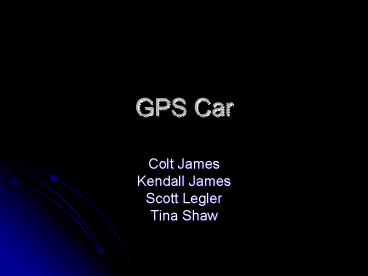GPS Car - PowerPoint PPT Presentation
1 / 36
Title:
GPS Car
Description:
Car successfully navigates the TTU R4 parking lot along the designated GPS waypoints. ... Burned out MOSFET on race day disabled the chopper circuit. Dead PWM ... – PowerPoint PPT presentation
Number of Views:46
Avg rating:3.0/5.0
Title: GPS Car
1
GPS Car
- Colt James
- Kendall James
- Scott Legler
- Tina Shaw
2
Objective
- Design and build an autonomous robot capable to
navigate an outside area of approximate size of
the TTU R4 parking lot by guidance of a GPS
sensor
3
Completion Requirements
- Car successfully navigates the TTU R4 parking lot
along the designated GPS waypoints. - Statistical data gathered from the course run.
4
GPS Background
- 24 geosynchronous satellites with an additional 3
in reserve. - Originally built and designed for the Department
of Defense.
5
Trilateration
Receiver
6
Point Spread (rainy day)
.001 minutes 6.06 ft per (Latitude) .001
minutes 5.07 ft (Longitude)
7
Latitude Deviation (rainy day)
Spread .0017 min. total .0008 min.
to either side 4 ft. walls
.001 minutes 6.06 ft per (Latitude) .001
minutes 5.07 ft (Longitude)
8
Longitude Deviation (rainy day)
Spread .0017 min. total .008
min. to either side 4 ft. walls
.001 minutes 6.06 ft per (Latitude) .001
minutes 5.07 ft (Longitude)
9
Heading
280 ft.
Turn 2
Turn 3
EE
East
South
North
60 ft.
West
Start
Turn 1
Pulse Power
.001 minutes 6.06 ft per (Latitude) .001
minutes 5.07 ft (Longitude)
10
Errors of GPS System
- Climate conditions
- Surroundings
- Speed of signal variations
- Errors in satellite almanacs
11
Hardware
Garmin GPS Reciever
Voltage Reg
Headlights
HC-12
Motor
Servo
Buffer
Chopper
12
Wiring Diagram
Buffer
5 V Regulator
9.6 Volt 1000mAh
Servo
HC-12
Switch -
To Chopper
Switch -
Voltage
GPS
- Voltage
Serial
PWM
13
HC12EVB
14
Star Up Mode Jumper
15
(No Transcript)
16
Garmin Reciever
- Input Voltage 6 40 V DC
- Input Current 120 mA
17
Motor Control
- Low-Side (Chopper) drive circuit
- D1 prevents back EMF
- R1 protects against current spikes
- R2 ensures the MOSFET is off when no signal is
present
18
- Servo
- Futaba S3003
- .23s / 60 _at_ 5V DC
19
Servo Signal
- 1.5 ms pulse for center
- 2 ms pulse for right
- 1 ms pulse for left
20
Servo Movement
21
Buffer Circuit
- Necessary when driving a load with PWM signals
- Prevents current spikes from affecting the HC-12
- Boosts current in the output signal
22
Headlights
- Two 5V blue LEDs
- Powered by 9V battery running through a 7805
voltage regulator
23
Power Budget
24
Garmin Receiver Output
25
Initialization
Set up Baud Rate
Initialize Transmit / Receive
Set System Clock as Base
Set Channels to use S clocks polarity to high _at_
start
Set Periods and Duty Cycles
Enable the pins enable channels
26
Wall Boundary Setup
Call F800 to get GPS data
Add 0005 to get OutBound
Subtract 0005 to get InBound
Add x value and set Wall for turn
Set Motor to Full
Delay to allow for speed build-up
Turn motor down
Check which Leg
27
Correction Turns
- All comparisons will differ depending on which
leg the car is on
Get New GPS Data
Load LonMin or LatMin Compare with Wall
Goto Course Turn
Load LatMin or LonMin Compare with Bounds
Greater than OutBound Turn Left
Less than InBound Turn Right
Repeat
28
Course Change Turns
Data is past Wall
Slow Motor Turn Servo Full Left
Load Counter
Counter 0
Counter gt 0
STOP Routine
Goto Appropriate Leg Routine
29
Correctional Turns
Car is going straight when GPS data comes and is
outside of the bounds. Correction Routine is
called
Finally, the servo returns to center and the
program returns to get more GPS points.
After delay, a duty cycle of a turn to the
opposite direction (slightly off center) is sent
to the servo. Again, a delay is ran.
Servo sends new duty cycle and the servo turns to
the appropriate angle. A delay routine is also
called and ran several times.
30
Overall Code Diagram
Initialization of Leg
Initialization of Program
Get GPS Data
End of Current Leg
Where at in Leg
End of Track
Turn 90 degrees to new leg
Stop Car
Within Current Leg
Within Bounds
Out of InBound
Out of OutBound
Make Correction
Make Correction
31
Code Testing Phases
- Servo and Motor control
- Read GPS
- Set-up Walls and Boundaries
- Combine Steering and Navigation
- First Leg
- Turns
- Full Track
Were we go to in testing
32
Problems
- Hardware
- Repeatedly burning out 5V regulators
- Voltage regulators from stockroom do not provide
stable 5V output - Current demands of the servo higher than what
was supplied by PWM - Burned out 741 op-amp disabled the buffer
circuit - Burned out MOSFET on race day disabled the
chopper circuit - Dead PWM ports on 2 HC-12 boards
- Wheels would not stay on course due to poorly
built front-end - Low Torque delivered by the DC motor
- Software
- Loading the stack pointer in byte-erasable
EEPROM - GPS Simul program does not work reliably with
the HC-12 - EEPROM Jumper reversed operation during cold
weather - but the headlights still work
33
Budget
34
Gantt Chart
35
Reference
- Dr. Gale
- Dr. Trost
- Dr. Nutter
- Dr. Dr. Giesselman
- http//healthweb.ofs.gov.za/othersites/hwm/Medical
20Waste20Management/Differential20GPS_files/dgp
sexp.htm - http//electronics.howstuffworks.com/gps.htm
- http//www.tntech.edu/me/courses/Canfield/me4370/P
ulseWidthModulation.htm - http//www.ee.nmt.edu/rison/ee308_spr01/supp/0103
05/pwm_3/pwm_3.html - http//www.runryder.com/helicopter/t7492p1/
- http//www.bcca.org/misc/qiblih/latlong_us.htmlTE
XAS - http//aol.wff.nasa.gov/aoltm/gps_sites/
- Gates, Thomas. GPS Vehicle. April 1, 2004
- Clark, Abe. GPS Guided Robot Car. April 20, 2004
- Most of the class
36
Questions?































